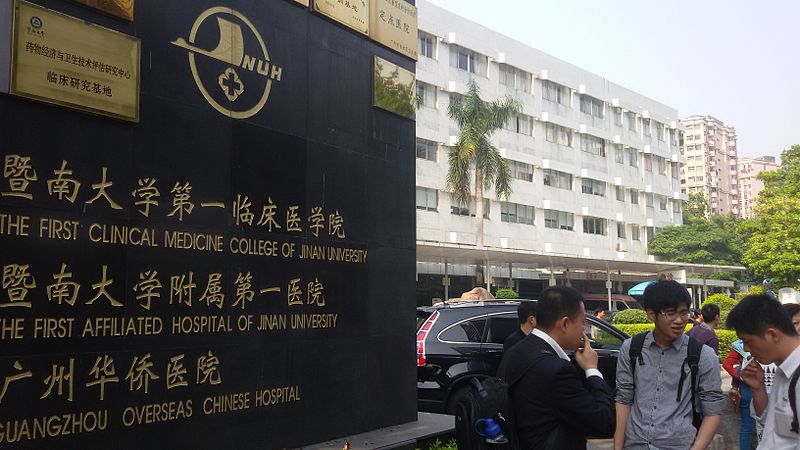The patient is a 21-year-old student, who found one of the hospitals through an internet ad. The advertisement assured that it is "the most advanced method", and recovery guaranteed, so the student had got his treatment for more than 30 thousand dollars. The treatment - immunotherapy using dendritic cells - proved to be ineffective, and the patient died a few weeks later.
The hospital, which the student addressed, is an official institution (a military hospital). However, as it became known later, the cancer treatment there was provided by structures related to Putian Medical Group - China's largest network of private clinics. After the patient’s death, the hospital stopped work. The incident’s investigation is now led by the Ministry of Health. Private hospitals, meanwhile, are losing profits.
The story also involves the largest Chinese Internet search engine - Baidu service, which accounts for about 80% of the search segment in China. The announcement of "the best method" was found there. Later, when the treatment did not work, the student blamed Baidu among others, calling it an "evil incarnate."
The charges were supported by both Internet users and authorities. The essence of the claim is to ensure that the search engine advertises questionable health structures, making a pretty penny out of this. The student’s death was the reason for launching a separate investigation in relation to Baidu. Against the background of the news, its shares have fallen by 10% in two days.
There are more than 12 thousand private clinics in China today – this is comparable to number of public hospitals. Most of them is controlled by Putian Medical Group. They are in great demand, being visited by hundreds of millions of patients annually.
The private clinics network is a relatively new thing in China. Perhaps this is the reason for scandalous stories appearing around them from time to time. Back in the late 1990s, there were reports, which showed that some of private doctors sold drugs at inflated prices, traded counterfeit medicines, and false-diagnosed healthy patients to prescribe unnecessary procedures and even surgery. There were even cases when they forced women, who were not going to give up the child, to abortion.
The practice of hard-selling medical services was extended. A source told that one of the methods was to designate an accompanee to a newcomer patient. The person stuck around the potential customer, threated him with consequences of the disease (flimsy sometimes), and hindered him from pondering the treatment. People searching for a job in the private medicine sector advertised themselves by stating how much money they would receive from each patient on average.
To some extent, government supported criticism towards private doctors. However, in the 2000s, the authorities took a number of decisions to spur activity of private clinics. In particular, they were allowed to set their own prices for services (previously the price was fixed by the State).
The popularity of private clinics was backed up by a large-scale advertising campaign. Such advertisements brought a significant part of income to media. In 2010, one of the province of Shandong’s local newspapers published a patient’s complaint about a local hospital. The hospital, in turn, sought revenge, deprived the newspaper of its advertising, and organized an attack on the editor. The office was raided by bandits, armed with knives and axes, headed by the clinic’s chief doctor himself. They smashed equipment, wounded several reporters and fled before police arrived.
Advertising of medical services has become one of the main income sources for Baidu search engine. According to Jefferies Hong Kong, this brings 20% to 25% of the company’s revenue. These numbers correlate with the official figures for 2014, according to which the private health companies spent on advertising on Baidu about 10 billion yuan (about $ 1.5 billion). The searcher’s revenue for the year amounted to about 50 billion yuan.
Baidu and Putian Medical Group’s relationship has not always been smooth. At some point, a spat between them reportedly occurred due to advertising rates. The clinics’ network found them excessive and announced a boycott for the search engine. Later, however, the conflict was settled.
Baidu now claims they closely check the sold advertising (according to the search engine, only in 2015 it turns away 30 million unscrupulous medical board). However, not so long ago, the company got involved in another advertising scandal. Then, it turned out that Tieba forum - one of Baidu’s services - sold the Administrators rights to people who used it to advertise private clinics.
Meanwhile, the authorities seem to be willing to use the situation as an excuse to increase control over the internet and search engines in particular. After the student's death, the official newspaper Global Times said that network regulation in China is too weak. Against this background, the other search engine - Qihoo 360 - stopped advertising of medical services without waiting for warning. The company explained the decision saying that it was done for sake of the users’ safety. Some people, however, saw it as a PR stunt, designed to improve self-image and to attract other advertisers, which could be scared away from cooperation with Baidu against the backdrop of recent events.
source: whatsonweibo.com
The hospital, which the student addressed, is an official institution (a military hospital). However, as it became known later, the cancer treatment there was provided by structures related to Putian Medical Group - China's largest network of private clinics. After the patient’s death, the hospital stopped work. The incident’s investigation is now led by the Ministry of Health. Private hospitals, meanwhile, are losing profits.
The story also involves the largest Chinese Internet search engine - Baidu service, which accounts for about 80% of the search segment in China. The announcement of "the best method" was found there. Later, when the treatment did not work, the student blamed Baidu among others, calling it an "evil incarnate."
The charges were supported by both Internet users and authorities. The essence of the claim is to ensure that the search engine advertises questionable health structures, making a pretty penny out of this. The student’s death was the reason for launching a separate investigation in relation to Baidu. Against the background of the news, its shares have fallen by 10% in two days.
There are more than 12 thousand private clinics in China today – this is comparable to number of public hospitals. Most of them is controlled by Putian Medical Group. They are in great demand, being visited by hundreds of millions of patients annually.
The private clinics network is a relatively new thing in China. Perhaps this is the reason for scandalous stories appearing around them from time to time. Back in the late 1990s, there were reports, which showed that some of private doctors sold drugs at inflated prices, traded counterfeit medicines, and false-diagnosed healthy patients to prescribe unnecessary procedures and even surgery. There were even cases when they forced women, who were not going to give up the child, to abortion.
The practice of hard-selling medical services was extended. A source told that one of the methods was to designate an accompanee to a newcomer patient. The person stuck around the potential customer, threated him with consequences of the disease (flimsy sometimes), and hindered him from pondering the treatment. People searching for a job in the private medicine sector advertised themselves by stating how much money they would receive from each patient on average.
To some extent, government supported criticism towards private doctors. However, in the 2000s, the authorities took a number of decisions to spur activity of private clinics. In particular, they were allowed to set their own prices for services (previously the price was fixed by the State).
The popularity of private clinics was backed up by a large-scale advertising campaign. Such advertisements brought a significant part of income to media. In 2010, one of the province of Shandong’s local newspapers published a patient’s complaint about a local hospital. The hospital, in turn, sought revenge, deprived the newspaper of its advertising, and organized an attack on the editor. The office was raided by bandits, armed with knives and axes, headed by the clinic’s chief doctor himself. They smashed equipment, wounded several reporters and fled before police arrived.
Advertising of medical services has become one of the main income sources for Baidu search engine. According to Jefferies Hong Kong, this brings 20% to 25% of the company’s revenue. These numbers correlate with the official figures for 2014, according to which the private health companies spent on advertising on Baidu about 10 billion yuan (about $ 1.5 billion). The searcher’s revenue for the year amounted to about 50 billion yuan.
Baidu and Putian Medical Group’s relationship has not always been smooth. At some point, a spat between them reportedly occurred due to advertising rates. The clinics’ network found them excessive and announced a boycott for the search engine. Later, however, the conflict was settled.
Baidu now claims they closely check the sold advertising (according to the search engine, only in 2015 it turns away 30 million unscrupulous medical board). However, not so long ago, the company got involved in another advertising scandal. Then, it turned out that Tieba forum - one of Baidu’s services - sold the Administrators rights to people who used it to advertise private clinics.
Meanwhile, the authorities seem to be willing to use the situation as an excuse to increase control over the internet and search engines in particular. After the student's death, the official newspaper Global Times said that network regulation in China is too weak. Against this background, the other search engine - Qihoo 360 - stopped advertising of medical services without waiting for warning. The company explained the decision saying that it was done for sake of the users’ safety. Some people, however, saw it as a PR stunt, designed to improve self-image and to attract other advertisers, which could be scared away from cooperation with Baidu against the backdrop of recent events.
source: whatsonweibo.com



















